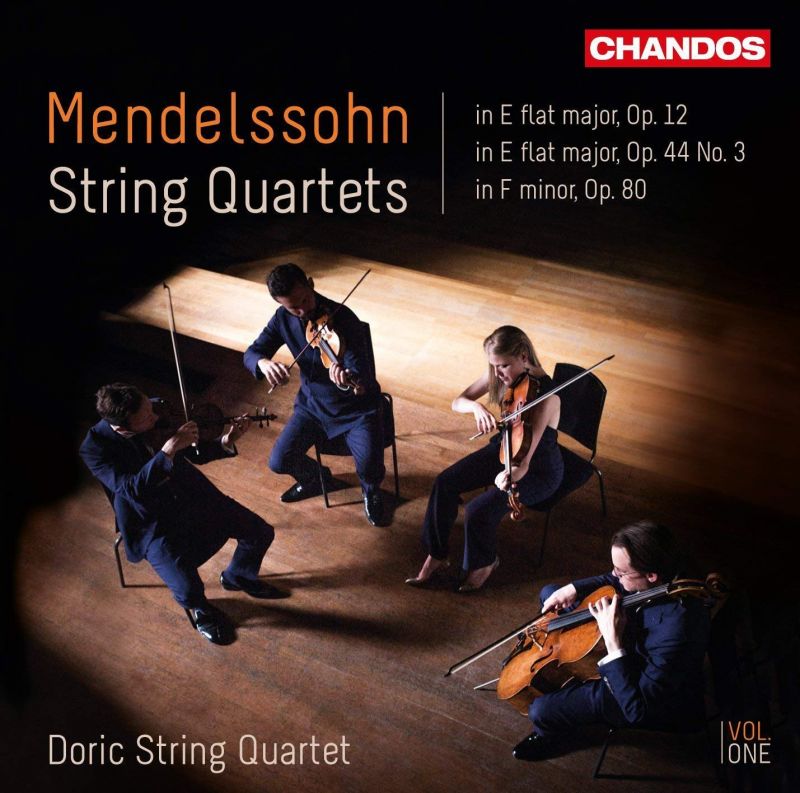MENDELSSOHN String Quartets Vol 1 (Doric Quartet)
View record and artist detailsRecord and Artist Details
Composer or Director: Felix Mendelssohn
Genre:
Chamber
Label: Chandos
Magazine Review Date: 10/2018
Media Format: CD or Download
Media Runtime: 86
Mastering:
DDD
Catalogue Number: CHAN20122(2)

Tracks:
| Composition | Artist Credit |
|---|---|
| String Quartet No. 1 |
Felix Mendelssohn, Composer
Doric String Quartet Felix Mendelssohn, Composer |
| String Quartet No. 6 |
Felix Mendelssohn, Composer
Doric String Quartet Felix Mendelssohn, Composer |
| String Quartet No. 5 |
Felix Mendelssohn, Composer
Doric String Quartet Felix Mendelssohn, Composer |
Author: Harriet Smith
All the traits that characterise their playing are to be found in this first volume of Mendelssohn quartets. They apply judicious portamento as they mould the opening bars of Op 12’s Adagio non troppo, while the following Allegro non tardante has a suppleness that makes it sound constantly new.
In the Doric’s Canzonetta, the faster middle section grows organically from the relaxed outer ones, rather than playing up the contrasts, as the Tippett Quartet do, finding an altogether more mischievous edge. The slow movement is the first violin’s chance to take wing and the Doric’s Alex Redington duly does, to warmly engaging effect, while the quartet’s collective ear for balancing sonorities constantly illuminates the textures. The finale gets its energy from the way they phrase the lines, while the Tippett have a more obsessive, one-in-a-bar feel; compared to both of them, the Escher are a little earthbound.
The Doric’s approach to Op 80 is less extreme than some – rather than going hell for leather in its first movement they instead draw out detail after detail along the way. If you want sforzando accents that rip through the music, then the Elias are still the ones to go for, but for something less searing, try this. The Elias continue their fraught agenda through the second movement, the Tippett also impressive here in their desperate energy. But the Doric see it as a heavier, slower scherzo and I’m not entirely convinced. The slow movement finds the Tippett the most Classical, the Ebène most obviously Romantic in their ardency. The Doric are closer to the Classical end of things, though a tremulously delicate vibrato gives their Adagio a touching fragility. Again, the Doric’s finale is moderate in pace – is it really Allegro molto? – though I like the way the fortissimo writing breaks in with due drama. But for me, this movement demands more intensity, something the Ebène and Elias provide in spades.
If there are some caveats about the Sixth Quartet, there are none about the Fifth, the last of Op 44. The give and take as motifs are shared between the players in the first movement is unerring, and here their relaxed pace works well, sounding even more inevitable than the Escher. The Scherzo, initially at a whisper, has energy without sounding unduly rushed, while the slow movement is deeply absorbing, satisfying and sonorously sad. The Parker, who impressed me, are faster here but both groups bring Mendelssohn’s plangent writing to life. All sadness is banished in the rushing finale – the Parker bring to this a fearless energy but the Doric are just as mesmeric, displaying an unerring ability to draw out what’s important from Mendelssohn’s frenetic textures. An impressive new addition to the Mendelssohn discography.
Discover the world's largest classical music catalogue with Presto Music.

Gramophone Digital Club
- Digital Edition
- Digital Archive
- Reviews Database
- Full website access
From £8.75 / month
Subscribe
Gramophone Full Club
- Print Edition
- Digital Edition
- Digital Archive
- Reviews Database
- Full website access
From £11.00 / month
Subscribe
If you are a library, university or other organisation that would be interested in an institutional subscription to Gramophone please click here for further information.




